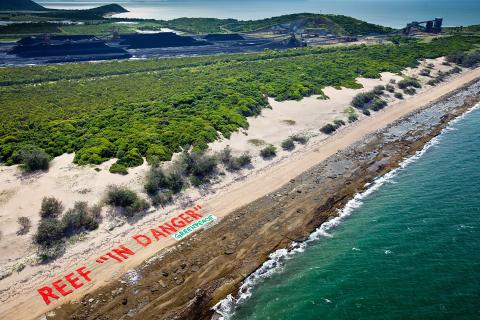Australia’s iconic Great Barrier Reef is under imminent threat from industrial development and may be considered for listing as a world heritage site “in danger” within the next year, a UN report said last week.
Citing the findings of a mission to the world’s largest living structure in March, the UN Educational, Cultural and Scientific Organization (UNESCO) recommended that: “In the absence of substantial progress,” its World Heritage Committee would consider such a listing in February next year.
Key pressures on the reef include coastal development, ports, liquefied natural gas facilities, extreme weather, grounding of ships and poor water quality, UNESCO said.

Photo: AFP
The reef’s outstanding universal value “is threatened and decisive action is required to secure its long-term conservation,” it said.
Australian organizations managing the reef have adopted high-quality practices, UNESCO said, but noted that “despite management successes there has been a continuing decline in the quality of some parts” of the reef.
Australia’s northeastern state of Queensland, where the reef is located, is one of the country’s fastest-developing regions.
Onshore are economically important coal mining operations, while the reef itself is a major tourist attraction.
In recent years, critics have pointed to the dangers posed to the reef by industrial development, particularly since 2010 when a Chinese coal carrier rammed into part of the reef.
In its report, UNESCO specifically mentioned plans for liquefied natural gas facilities at Curtis Island, and ongoing development of the key coal port of Gladstone.
Future port infrastructure plans should be limited to “existing and long-established” ports in the region, it said.
UNESCO called for the setting of clear, legal targets for the reef’s condition, and said the high level of approvals for planned development in recent years was a concern.
“Considering the high rate of approvals over the past 12 years, this unprecedented scale of development affecting or potentially affecting the property poses serious concerns over its long-term conservation,” it said.
The politically influential Greens, who support Australian Prime Minister Julia Gillard’s minority government, responded to the report by calling for Australia to reduce its dependence on coal.
Australian Environment Minister Tony Burke acknowledged that climate change and coastal development posed ongoing threats to the reef, but said the report contained no surprises.
“The UNESCO mission in March acknowledged that our management of the Great Barrier Reef World Heritage Area is still considered to be best practice,” Burke said in a statement.
The World Heritage Committee will discuss the report when it meets in St Petersburg, Russia, later this month.

A fire caused by a burst gas pipe yesterday spread to several homes and sent a fireball soaring into the sky outside Malaysia’s largest city, injuring more than 100 people. The towering inferno near a gas station in Putra Heights outside Kuala Lumpur was visible for kilometers and lasted for several hours. It happened during a public holiday as Muslims, who are the majority in Malaysia, celebrate the second day of Eid al-Fitr. National oil company Petronas said the fire started at one of its gas pipelines at 8:10am and the affected pipeline was later isolated. Disaster management officials said shutting the

US Vice President J.D. Vance on Friday accused Denmark of not having done enough to protect Greenland, when he visited the strategically placed and resource-rich Danish territory coveted by US President Donald Trump. Vance made his comment during a trip to the Pituffik Space Base in northwestern Greenland, a visit viewed by Copenhagen and Nuuk as a provocation. “Our message to Denmark is very simple: You have not done a good job by the people of Greenland,” Vance told a news conference. “You have under-invested in the people of Greenland, and you have under-invested in the security architecture of this

Japan unveiled a plan on Thursday to evacuate around 120,000 residents and tourists from its southern islets near Taiwan within six days in the event of an “emergency”. The plan was put together as “the security situation surrounding our nation grows severe” and with an “emergency” in mind, the government’s crisis management office said. Exactly what that emergency might be was left unspecified in the plan but it envisages the evacuation of around 120,000 people in five Japanese islets close to Taiwan. China claims Taiwan as part of its territory and has stepped up military pressure in recent years, including

UNREST: The authorities in Turkey arrested 13 Turkish journalists in five days, deported a BBC correspondent and on Thursday arrested a reporter from Sweden Waving flags and chanting slogans, many hundreds of thousands of anti-government demonstrators on Saturday rallied in Istanbul, Turkey, in defence of democracy after the arrest of Istanbul Mayor Ekrem Imamoglu which sparked Turkey’s worst street unrest in more than a decade. Under a cloudless blue sky, vast crowds gathered in Maltepe on the Asian side of Turkey’s biggest city on the eve of the Eid al-Fitr celebration which started yesterday, marking the end of Ramadan. Ozgur Ozel, chairman of the main opposition Republican People’s Party (CHP), which organized the rally, said there were 2.2 million people in the crowd, but